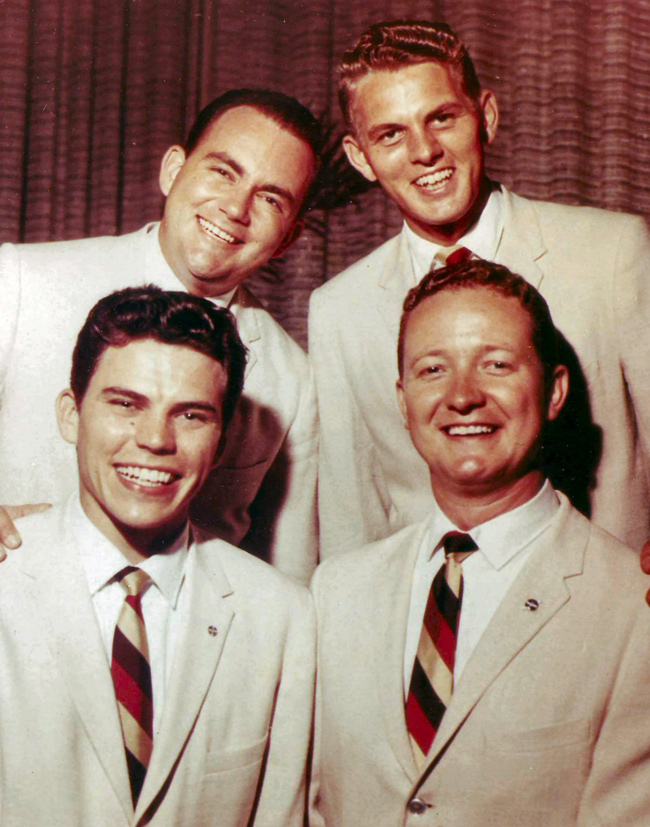In Celebration of the Human Voice - The Essential Musical Instrument
Home | Doo Wop | Barbershop | World | Contemporary | Christian | Vocal Jazz | Choral | Christmas | Instructional | Arrangements
Classical | Opera | Musicals | Personality | Young Singers | Disney | Videos | Songs | The Artists

Suntones History

Click Here for Sheet Music and Songbook Vocal Arrangements
The Suntones began singing in 1957 with Gene Cokeroft on tenor, Clark Bell singing lead, Bill Wyatt on baritone and Danny Whipple on bass. Wyatt wrote wild and crazy arrangements of songs like That Old Black Magic. In addition to singing barbershop, the quartet enjoyed singing "Hi-Lo's" songs and was known for their ability to tune chords. Families and draft boards took their toll on original members and forced some personnel changes. In November of 1958 the Suntones were looking for a new bass, when into a chapter meeting wandered Bill Cain. He sang a song with Gene, Bill and Bob Franklin. The sound was so impressive they rehearsed nine nights in a row and entered the district contest. They were the surprise of the weekend, coming in second. The very next year, the quartet won the first district quartet championship of the newly formed Sunshine District. It was that weekend they met baritone Harlan Wilson. Their first exposure to the International Convention audience was in 1959 in Chicago where they placed 24th despite Bob having the flu. In the spring of 1960, Bill Wyatt had to withdraw from the quartet. They called Harlan in West Palm Beach. In an instant, they knew that "this was it". The quartet burned up the Florida Turnpike every other night for six weeks to win the right to represent the Sunshine District in Dallas that summer. The Suntones placed eighth in Dallas. At the Barbershop Quartet's Society's International Competition in Philadelphia, the 1961 favorites for the gold medals where the Nighthawks and The Town and Country Four. By the semi-finals, the Suntones had the audience on their side. Call it luck, destiny or a little of both, the Suntones were picked to sing last in the top ten final round of competition Saturday night. They began that night by singing the beautiful Mighty Lak A Rose. The entire convention audience stood up. The cheers and applause seemed to go on forever. The quartet was a bit surprised. This was the first standing ovation received by a competitor in the history of the Society. As if it were fate, they ended the contest with a song that would become a trademark, Bye Bye Blues. The Suntones later discovered that they had racked up a 350 point winning margin. Some suggested even if they hadn't sung in the finals, they would have had enough points to win anyway. As with all International Champion Quartets, they were crowned, celebrated, cheered, and treated like celebrities and sent home. Here is where many gold medalist quartets begin to slowly but surely disappear. For the Suntones, it was only the beginning. After the championship year, the Suntones decided they might as well do this thing right. They began to set new standards and became innovators. The quartet decided to produce recordings as often as possible and sought professional bookings outside of barbershop circles. Their heavy schedule forced them to improve and perfect their presentation. It was hard work that paid off. Soon the Suntones could be found singing at New York's Plaza Hotel on the same bill as Benny Goodman. When Jackie Gleason moved his popular variety show to Miami, he needed a barbershop quartet, the members of which could also serve as backup singers. The Suntones appeared with Gleason, Danny Thomas, Tennessee Ernie Ford, Mike Douglas and other well known stars such as Louis Armstrong, Bing Crosby, Bob Hope, Eddie Arnold, The Four Freshmen and even President Gerald R. Ford. In addition to performing well, the Suntones set themselves apart by introducing new songs into their performances and by creating a library of recordings not yet matched in size by any other barbershop quartet. Individually, each member of the Suntones grew in experience and talent as the quartet traveled the country. After the departure of Bob Franklin in 1979, the quartet continued to perform with Drayton Justus on lead, until their swan song in January of 1985 in Montclair, NJ during a special tribute to arranger Walter Latzko. They made a handful of appearances after 1985 until the International Convention in Calgary, Alberta Canada in 1993. The current configuration of the Suntones has Bob Franklin back in the lead spot for the first time in over 25 years. Sadly, Bill Cain lost his battle with cancer in 2004. The Suntones' final public appearance with Bill was at the 50th Anniversary of the Fairfax Chapter on October 18, 2003 though his health did not permit him to sing. Todd Wilson now sings bass. The Suntones were ahead of their time, innovators in almost every field of quartetting. They were known for their Broadway show music, their sound system, (they carried their own and performed with individual hand held microphones), proactive management and an extensive library of recordings. With the release of their "Complete Works" five-CD, double album set, and the 2003 release of a new a new "Suntones LIVE" CD recorded in 1972, a new generation was able to re-discovere one of the all-time great quartets of the 20th Century. In 2005, the Suntones joined the Buffalo Bills as one of only two quartets to be inducted into the Barbershop Harmony Society's "Hall of Fame." Awards |
Select a Category |
Want to Sing? - Find a Chorus Near You
List of Choruses by State | List of Choruses by City
